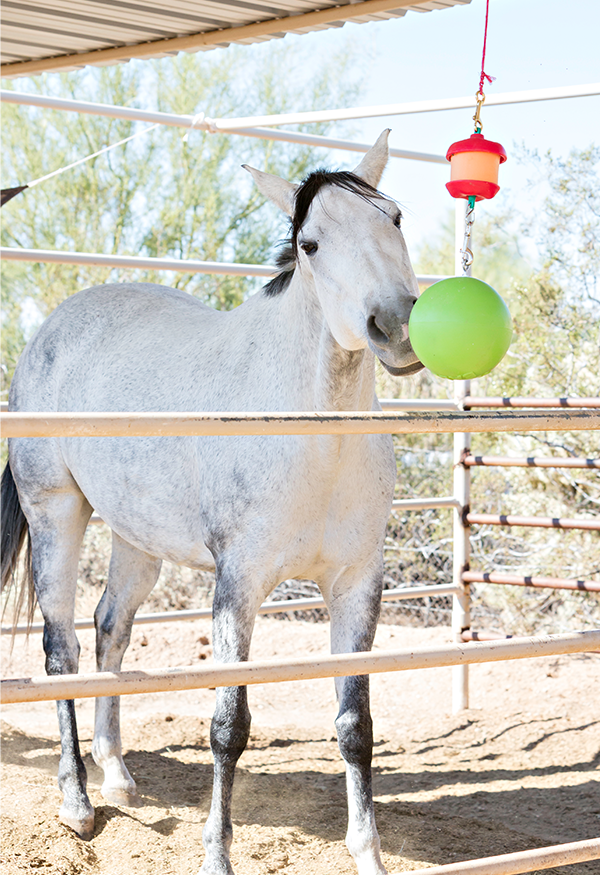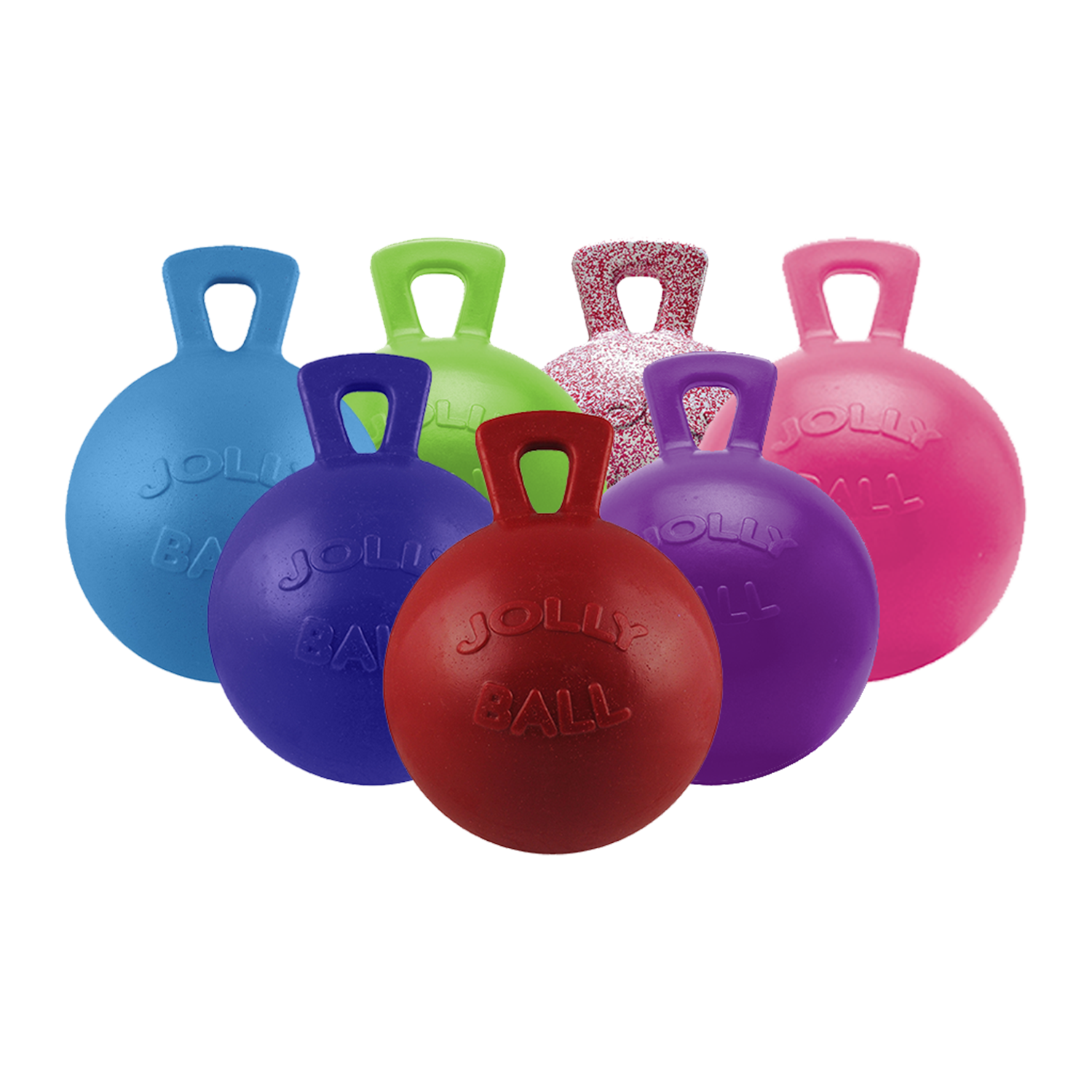Your Cart is Empty
FREE Economy Shipping on orders over $75
Menu

FREE Economy Shipping on orders over $75
Why Equine Enrichment Matters: Enhancing Your Horse’s Mental and Physical Well-being
February 18, 2025 4 min read

Author: Kara O'Laughlin | Equine Bodywork Online - Instructor & Co-Founder
As an equine massage therapist, I spend a lot of time with horses who are dealing with physical discomfort, behavioral issues, or stress-related tension. One of the most common underlying factors I see? Boredom.
Horses are incredibly intelligent, social, and active creatures, but domestication has drastically changed their lifestyle. In the wild, horses live in dynamic herds, constantly moving and interacting with their environment.
Their day consists of grazing across vast distances, socializing with herd members, navigating different terrains, and staying alert to potential predators. Studies suggest that wild horses travel between 10 to 20 miles per day in search of food, water, and shelter. This continuous movement plays a crucial role in maintaining their physical health, promoting circulation, and preventing obesity or metabolic issues. Additionally, their large herds provide ample opportunities for social bonding, hierarchy establishment, and interactive play, which keeps their minds sharp and emotions balanced.
Now, compare that to the average domesticated horse. Many spend long hours confined in a stall or a small paddock with limited grazing and social interaction. Their meals are delivered to them at set times, eliminating the need to forage. Their environment rarely changes, and they often lack opportunities for natural movement or mental stimulation. Even horses that receive ample turnout often spend their time in the same paddock, with little variation in terrain, companions, or food sources.
While turnout is crucial, it does not fully replicate the ever-changing, mentally stimulating experiences of a wild horse’s environment. The lack of environmental change and constant engagement leads to boredom, which can manifest as stress-related behaviors like cribbing, weaving, stall-walking, or excessive pawing. Research has shown that horses with limited mental stimulation exhibit higher levels of cortisol, a stress hormone, which can contribute to anxiety, muscle tension, and even digestive issues such as ulcers.
Exercising a horse for an hour a day simply isn’t enough to satisfy their drive to live as naturally as possible. Unlike humans, who may be content with short bursts of exercise, horses are built for nearly constant, low-intensity movement and interaction. Without opportunities for enrichment, they may resort to repetitive, compulsive behaviors as a way to cope with their lack of stimulation.
The Importance of Equine Enrichment
Equine enrichment is about providing horses with activities that stimulate their minds, encourage movement, and mimic aspects of their natural lifestyle. Not only does this improve their mental well-being, but it also has significant physical benefits, such as improving coordination, reducing muscle tension, and preventing injuries caused by repetitive behaviors or lack of movement.
Ideas for Equine Enrichment
There are plenty of ways to enrich your horse’s life, and the best approach depends on their individual personality, living situation, and physical needs. Here are a few options:
1. Toys and Interactive Feeders
Horsemen’s Pride offers a variety of excellent enrichment products that can help keep horses engaged. Their Jolly Ball, for instance, is a fantastic way to encourage movement and play, especially for horses turned out alone. The Jolly Mega Ball is another great option, allowing horses to nudge, chase, and interact with a large, durable toy.
Slow feeder hay nets and treat-dispensing balls can also add a layer of mental stimulation to mealtime, encouraging natural foraging behavior and prolonging feeding time, which is beneficial for both mental engagement and digestive health.
2. Environmental Changes
Introducing variety into a horse’s environment can help prevent boredom. This might mean rotating turnout areas, adding different footing textures (such as sand, gravel, or logs) for them to navigate, or creating a track system that encourages movement throughout the day.
3. Social Interaction
Horses are herd animals, and socialization is crucial for their mental well-being. If possible, allowing turnout with a compatible buddy or group can significantly improve their quality of life. Even if full turnout isn't an option, having a neighboring horse to interact with over the fence can help fulfill their need for companionship.
4. Ground Pole Exercises
Setting up ground pole courses or cavalettis can engage a horse’s mind while also promoting flexibility, balance, and strength. Changing the pattern regularly keeps things interesting and encourages mental focus. I highly encourage all my clients to look into GroundPoleWorkouts.com for amazing exercises to engage the mind and body. I designed this program to not only help develop the horse physically, but also create profound mental awareness while the horse must navigate new grids and patterns.

5. Equine Massage as Enrichment
One of the lesser-known but incredibly effective forms of enrichment is equine massage therapy. While most people think of massage as a treatment for sore muscles, it also provides a profound mental benefit. Horses must focus on subtle sensations and body awareness during a massage session, helping them tune into their own movement and relaxation.
Massage also stimulates circulation, promotes relaxation, and can release endorphins, which contribute to a happier, more content horse. When combined with other forms of enrichment, massage can be an integral part of keeping a horse both mentally and physically balanced. If you’d like to offer your own horses equine massage, check out EquineBodyworkOnline.com for simple and beneficial muscle release routines.
Conclusion
Incorporating enrichment into your horse’s routine doesn’t have to be complicated or expensive. Simple changes like adding interactive feeders, providing social opportunities, or varying their exercise routine can make a huge difference. By prioritizing their mental and physical well-being, you can help prevent boredom-related behaviors, reduce stress, and create a more engaged, happy, and healthy horse.
As an equine massage therapist, I see firsthand how enrichment, movement, and hands-on therapy all play a role in equine wellness. When we consider the whole horse—their mind, body, and natural instincts—we set them up for a richer, healthier, and more fulfilling life.
HAVING A JOLLY GOOD TIME?
Keep the good times going! Sign up to receive monthly treats directly to your inbox!

TAKE 10% OFF
Signup for emails and take 10% off your first order!

















